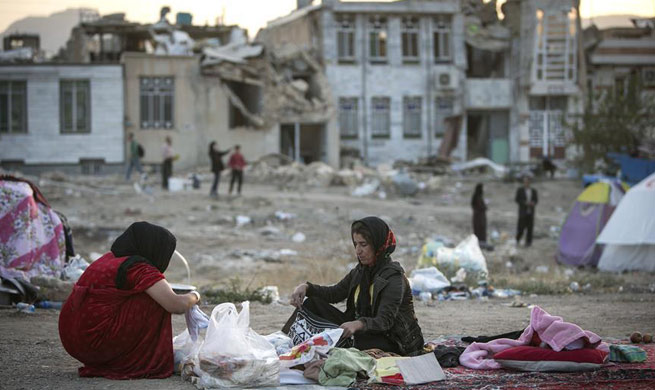ISLAMABAD, Nov. 16 (Xinhua) -- Mukhtar Ahmad, a retired senior government official, is attending his 37-year-old daughter who is being treated at a hospital in Islamabad, after being diagnosed with diabetes.
"They are cutting her body, it is very painful for her, it is very painful for my wife and me, she is in a bad condition, they have amputated her arm, a visibly broken Ahmad told Xinhua after attending a seminar organized by Islamabad's Shifa International Hospital recently.
"They removed portions from her back and they will perform more surgeries," Ahmed added.
Ahmad's daughter is just one of 7.1 million people in Pakistan who suffer from diabetes. The country has the seventh-highest diabetic population in the world, according to figures released by the National Institute of Diabetes and Endocrinology.
According to the institute's statistics, about 52,000 women and 36,000 men die of diabetes in the country annually.
The figures were released in connection with World Diabetes Day, which was observed in the country on Nov. 14, with the theme "Women and Diabetes."
Shahnaz Nawaz, a doctor at the hospital, told Xinhua that the disease is increasing at an alarming rate among urban women, mainly because of their lifestyles.
Nawaz said most of her diabetic patients are women who are not in the habit of doing domestic chores, as they have maids to cook, clean and wash for them. The doctor explained that a lack of physical activity not only made them gain weight, but also resulted in diabetes.
Pakistan has registered a three-fold increase in the number of Type II diabetic patients during the past 20 years.
Recent studies by the International Diabetes Federation for Asia revealed that 26.3 percent of the Pakistani population from both rural and urban areas are suffering from the disease, compared to 8.9 percent in a survey conducted in 1996-1997.
Umar Raja, an endocrinologist from Shifa International Hospital Islamabad, said Pakistan's middle class has increased over the last a few years and more and more people can afford fast food, fizzy drinks and processed foods now, but are spending less time on exercises, which make them prone to diabetes.
Doctors say that roughly every fourth person in the country is either suffering from, or is highly prone to diabetes, and that children and teenagers are also affected by the disease due to their "couch-potato" lifestyles.
"Kids and teenagers these days are more into technology, fast food, fizzy drinks and other unhealthy food. They prefer mobile and computer games over outdoor sports, they also have a heavy burden of studies, due to which they are becoming obese and also vulnerable to diseases," Asma Batool, a sociology teacher at a private university in Islamabad, told Xinhua.
The numbers of Diabetic patients have also sharply increased in rural areas over the last few years and mechanized farming with physical exertion totally removed from such work accounting for the rise.
Javed Ashraf, a physician in a village in the country's eastern Punjab province, said even village people eat processed food and are not as hard working as they used to be. He said both rural and urban people in Pakistan consume processed rice, potatoes, wheat and carbonated drinks almost everyday.
"Those who eat this unhealthy food and don't work out, suffer from diabetes and other diseases, besides, they don't take medication on regular basis, which makes their diabetes worse," Ashraf said.
According to a recently survey conducted, more than 76.2 percent of Pakistanis were found to be overweight, as their body mass indexes or height-to-weight ratio is higher than international health standards.
Raja reiterated that prevention is better than cure and said the disease can be avoided or controlled in up to 60 percent of cases if people make lifestyle changes, otherwise the country is feared to become third or fourth in the world with the highest number of diabetic patients.
Mukhtar Ahmad said diabetes is more serious than anyone could imagine, adding that he has recommended everyone in his family and his friends to go for a blood test once a year to avoid the situation his daughter is in.
"We were a happy family until my girl was diagnosed with Carbuncle because of diabetes two months ago. Since then she has been in hospital and I don't know whether I'll be able to take her back home alive or not."
"I ask everyone I meet to undergo blood screening to control the disease before it turns into a real monster," Ahmad said.
















